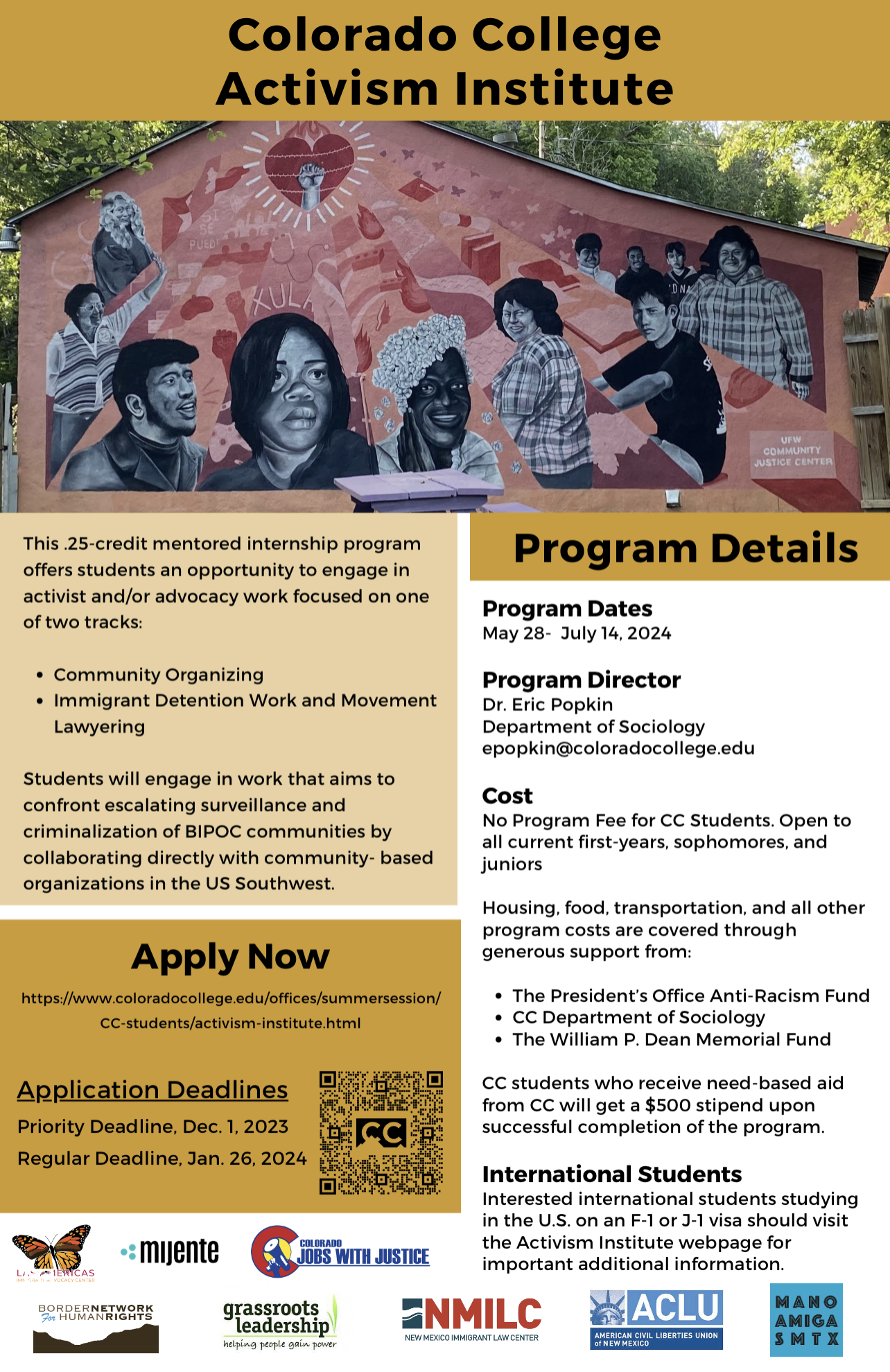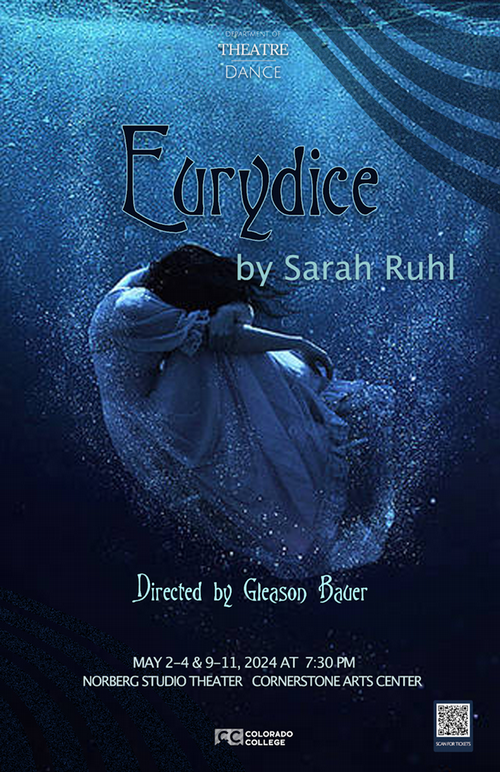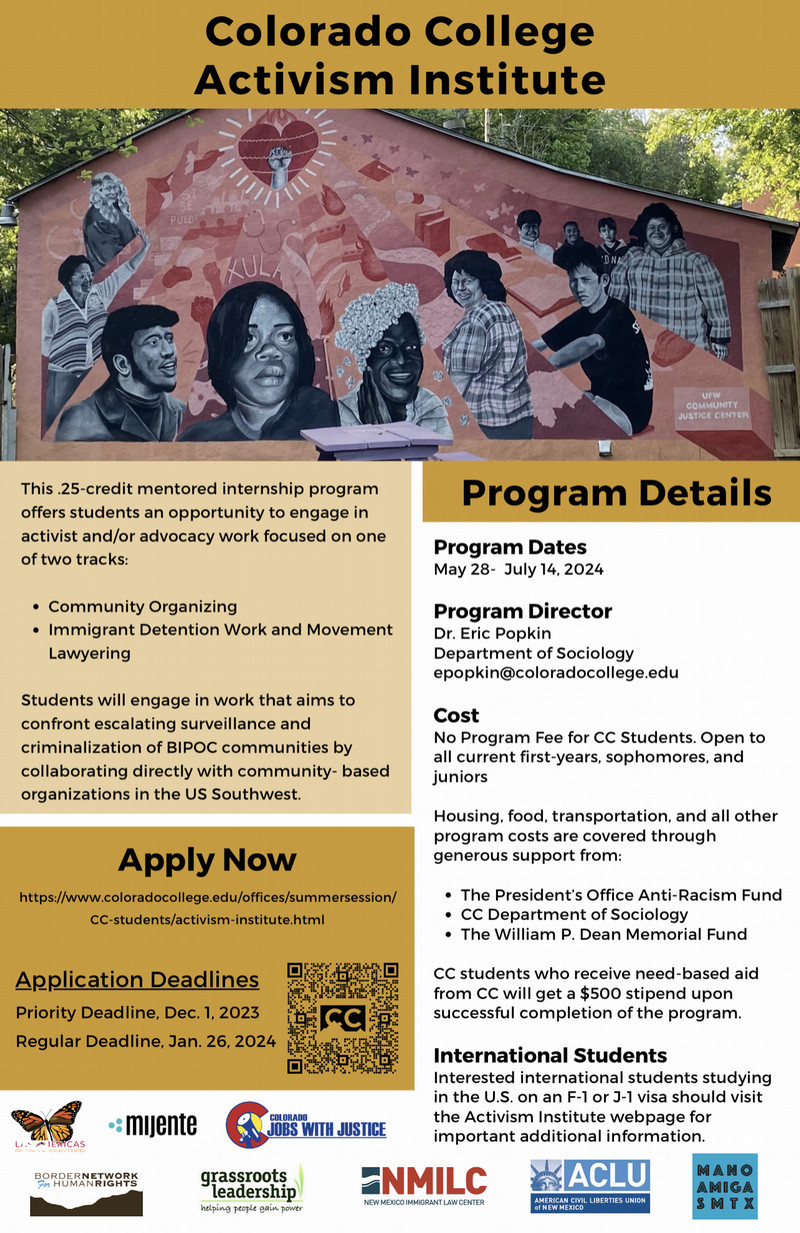Announcements
|
|
|
|
Come pause over lunch from at 12:15 p.m (or when you get out of class) in cozy community at Shove Council. Shove Council is a student led conversation group discussion meaningful questions about life and spiri…
Posted by Kholbrook
|
|
|
|
|
Gather in community for the 62nd for the Annual Festival of Lessons on Sunday, Dec. 3 at 6 p.m in Shove Chapel. This Advent service of scripture, carols, and choral pieces weaves in the diversity of music of t…
Posted by Kholbrook
|
|
|
|
|
Review the basics of interviewing and practice behavioral interview questions with your peers. ALL majors and class years are welcome.
When: Monday, December 4th
Time: 1:00-2:00 p.m.
Where: Career…
Posted by s_akinchina
|
|
|
|
|
Colorado College Collaborative Clay Club Open Session is a set of scheduled opportunities for CC students, faculty, and staff to use the FAC’s Bemis School of Art clay studio in a non-instructional fashion.
…
Posted by awermuth
|
|
|
|
|
Colorado College Collaborative Clay Club Open Session is a set of scheduled opportunities for CC students, faculty, and staff to use the FAC’s Bemis School of Art clay studio in a non-instructional fashion.
…
Posted by awermuth
|
|
|
|
|
Student Workshop: Tuesday, November 28
3:30-4:30 in the Creativity & Innovation building (232 E Cache La Poudre St.)
Venture into meaningful conversations through a series of fun and random “lyric…
Posted by mforbes
|
|
|
|
|

The CC Activism Institute is an internship program that offers students an opportunity to engage in advoc…
Posted by ghart2023
|
|
|
|
|
CC Summer Study Away Fair
All CC Summer Away Blocks will be there. Learn about programs, courses, financial aid, the Wild Card, and how to apply.
Shop around. Find the right summer block away …
Posted by abertsche
|
|
|
|
|
The Winter 2023 and Spring 2024 Graduation Applications are open and available in Banner SSB. Those eligible to apply have ea…
Posted by anicholas
|
|
|
|
|
Spring Preregistration (Spring Blocks 5-8 + Registration Passcode)
Opens: Monday, 11/06 | Week 3, Block 3 | Nov 6
Closes: Friday, 12/01 | Week 1, Block 4…
Posted by anicholas
|
|
|
|
|
The Journalism Institute is proud to announce that veteran journalist Tina Griego is teaching “Introduction to Journalism” in Block 4. Griego was a …
Posted by jyim
|
|
|
|
|
Are you interested in being a QRC Peer tutor? Have questions about applying? The QRC will be hosting an Info Session on Nov 29th (1st Wed) at 4:00 PM in Tutt Library 238. Come introduce yourself and learn more!…
Posted by awebb
|
|
|
|
|

Looking for a fun, creative, high-impact learning experience? Want FULL CREDIT for partic…
Posted by squinn
|
|
|
|
|


You’re Invited To…
Accessi-CHILL-ity!
We understand how important it is for …
Posted by zlounsbury
|
|
|
|
|

Posted by tshubert
|
|
|
|
|

Posted by tshubert
|
|
|
|
|

The Colorado College Choir and Chamber Chorus, und…
Posted by lgregory
|
|
|
|
|

The CC Guitar Ensemble, under the direction of Dale Miller and assi…
Posted by lgregory
|
|
|
|
|
 … …
Posted by bgreenly2023
|
|
|
|
|
On Dec 5th, come and attend a William Javonovich Lecture in Public Affairs about democratic accountability in Classical Athens as it relates to our current political moment. Ella Street is a Social Science and …
Posted by acordoba2023
|
|
|
|
|
Join us to learn about the Colorado College Public Interest Fellowship Program (PIFP). CC’s PIFP offers students paid summer and yearlong fellowships with Colorado nonprofits that work towards systemic change. …
Posted by ncepeda
|
|
|
|
|

Carnival of the Animals by Camille Saint-Saëns is the h…
Posted by jhunt
|
|
|
|
|
Students: In order to be placed at the most appropriate language level, you are required to take our online…
Posted by aroberts2023
|
|
|
|
|

Posted by tshubert
|
|
|
|
|
The Group Fitness schedule for block 4 has been posted and can be found here.
All classes are free — all equipment is provided — all cla…
Posted by cstarr
|
|
|
|
|
Join us for Queer Horizons an Exhibition Opening and Artist Talk by John Fifield-Perez the inaugural Fiber Fellowship Visiting Artist on November 30th. John’s work centers themes of queerness, intimacy…
Posted by rparker
|
|
|
|
|
Join us on Wednesday, December 6th from 4:00-7:00pm for an evening of music, weaving, food, film, and play. Arts & Crafts, the Music Library & the Expression of the Arts LLC are coming together to provi…
Posted by rparker
|
|
|
|
|
Need a creative outlet this block? Registration is now open for Arts & Crafts classes and workshops. We have spaces available in our jewelry, punch needle classes as well as one-day weaving workshops. Also …
Posted by rparker
|
|
|
|
|
We are excited to host the 2023 Arts and Crafts Fair at Colorado College on Friday, December 8th and Saturday, December 9th at Worner Campus Center. The Arts and Crafts fair celebrates local an…
Posted by rparker
|
|
|
|
|
Need a creative outlet this block? Registration is now open for Arts & Crafts classes and workshops. We have spaces available in our jewelry, punch needle classes as well as one day weaving workshops. Also …
Posted by rparker
|
|
|
|
|
Join us for Queer Horizons an Exhibition Opening and Artist Talk by John Fifield-Perez the inaugural Fiber Fellowship Visiting Artist on November 30th. John’s work centers themes of queerness, intimacy…
Posted by rparker
|
|
|
|
|
PIFP Fellows can expect…
- Paid work for social change
- Meaningful projects and significant work experience in public interest fields
- A high-quality experience
…
Posted by ncepeda
|
|
|
|
|
Join us to learn about the Colorado College Public Interest Fellowship Program (PIFP). CC’s PIFP offers students paid summer and yearlong fellowships with Colorado nonprofits that work towards systemic change. …
Posted by ncepeda
|
|
|
|
|

Posted by ghart2023
|
|